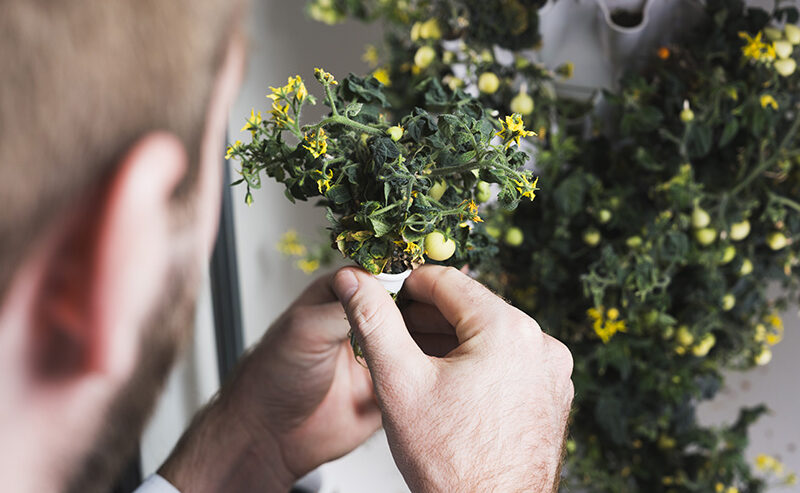Anu receives grant from NSF’s Technology Enhancement for Commercial Partnerships program
Funding will accelerate manufacturing of 100% compostable seedpods used in anu’s smart gardens

Anu’s fully automated smart gardens grow daily servings of produce, like these fruiting plants, using aeroponics and compostable seedpods. The company has received a $194,197 grant through the National Science Foundation’s Technology Enhancement for Commercial Partnerships program. (Photo provided)
EVANSVILLE, Ind. — Anu™, a health and wellness brand developing innovative controlled-environment agriculture systems, has received a $194,197 grant through the National Science Foundation’s Technology Enhancement for Commercial Partnerships, or TECP, program.
Purdue University alumni Scott Massey and Ivan Ball founded anu, which has received funding from Purdue Innovates. Anu currently is led by partners Sven Nelson, Ball and Massey.
Anu commercializes fully automated, in-home and commercial smart gardens that grow daily servings of produce using compostable seedpods and aeroponics. Aeroponics is a form of hydroponics, the technique of growing plants without soil.
CEO Massey said the grant marks a significant milestone in anu’s journey to redefine home gardening and localized production.
“This TECP funding from the NSF will help us in the final push to commercialization,” he said. “It will support the development for high-throughput manufacturing of 100% compostable seedpods.”
The supplemental funding opportunity is for active NSF Small Business Innovation Research or Small Business Technology Transfer Phase II grant awardees. The NSF awarded anu a Phase II SBIR grant for $970,993 in 2023.
Simplifying aeroponics, addressing energy concerns
Massey said anu’s technology is based on aeroponics, a soil-free growing method developed by NASA. It grows food three times faster and uses 90% less water than traditional gardening, and it enables monthly harvests year-round without pesticides or preservatives.
Time-lapse showing produce growing in anu’s fully automated smart gardens, which use aeroponics and compostable seedpods. (anu image) Download image
Massey said the anu technology also enables users to grow fresh produce near or at the point of consumption.
“This eliminates the need for perishable produce supply chains that are prone to losses as much as 40% from field through the end consumer,” he said. “These losses exacerbate an already stressed environment that must overproduce to account for supply chain losses.”

Massey said anu’s innovations simplify traditional aeroponic cultivation, which requires skilled labor and expensive equipment to manage nutrients and pH levels. He draws a parallel between the company’s seedpods and Keurig’s single-serve coffee makers.
“Keurig transformed coffee brewing from a time-consuming task into a quick, convenient process,” he said. “Similarly, our compostable seedpods simplify home and commercial cultivation by packaging seeds, growth media and nutrients into a single consumable that can be composted or replanted in soil. This eliminates the complexity and skilled labor associated with traditional systems, which addresses the greatest barrier to widespread adoption.”
Massey said anu’s innovations also address criticisms of high power consumption leveled against the traditional controlled-environment agriculture industry.
“Our proprietary Rotary Aeroponics® system, refined quietly over the past few years, significantly enhances energy efficiency in terms of grams of produce per kilowatt-hour,” he said. “The system is inspired by biomimicry of trees and optimizes light exposure. It reduces the total number of LEDs needed to illuminate the aeroponic tower expanding outer plant canopy, demonstrating our commitment to reducing energy consumption while improving yield.”
Expanding produce options
Massey said anu is expanding its Pure Produce® offerings into flowering and fruiting plants like peppers, tomatoes and cucumbers. He said these plants have a longer growth cycle and more specific lighting requirements, making them much harder to grow than leafy green produce due to energy demands.
“Traditional nonrotary systems struggle with managing thermodynamic heat from lights, leading to high costs or unwanted heating in homes, making it impossible to profitability grow fruiting varieties beyond less light-intensive leafy greens varieties such as lettuces, kales, etc.,” he said. “Anu’s remarkably efficient system operates at about $5 per month in power for daily servings of produce, a small fraction of the power costs of other systems, with the potential to be even more efficient in the near future.”
Anu received a $75,000 investment from the Ag-Celerator Fund, co-founded by the Purdue Research Foundation and Purdue’s College of Agriculture. It has received Phase I and Phase II SBIR grants from the National Science Foundation and matching funds from Elevate Ventures, as well as a $200,000 Indiana Manufacturing Readiness Grants award.
Massey recently was named to the Forbes 30 Under 30 in the Manufacturing and Industry category. Anu received the AgriNovus Indiana HungerTech Challenge Award at the 25th annual TechPoint Mira Awards, recognizing its work in market-driven technologies that enhance food distribution and security. TechPoint, a Central Indiana Corporate Partnership initiative, supports Indiana’s digital innovation economy and tech ecosystem.
“Indiana’s long-standing industry expertise of appliances and advanced polymer materials for consumer packaged goods has been instrumental in anu’s initial success, leading to profound and lasting impacts toward sustainability and food sovereignty,” Massey said.
About anu
Anu™ is a dedicated health and wellness brand, committed to bringing the simplicity and purity of growing fresh produce into the comfort of your home. Our highly efficient and sustainable Rotary Aeroponics® technology supports a “Nespresso for plants” business model, offering a straightforward and recurring seedpod subscription service to help you cultivate Pure Produce® that not only sets a new standard for nutrition and flavor, but also food safety. Founded by a team of former NASA research engineers from Purdue University, anu is now taking steps to bring these advanced technologies into everyday living spaces and commercial settings, supported by funding from Purdue Innovates, the National Science Foundation and the Indiana Manufacturing Readiness Grants to enhance our compostable seedpod production capabilities.
About Purdue University
Purdue University is a public research institution demonstrating excellence at scale. Ranked among top 10 public universities and with two colleges in the top four in the United States, Purdue discovers and disseminates knowledge with a quality and at a scale second to none. More than 105,000 students study at Purdue across modalities and locations, including nearly 50,000 in person on the West Lafayette campus. Committed to affordability and accessibility, Purdue’s main campus has frozen tuition 13 years in a row. See how Purdue never stops in the persistent pursuit of the next giant leap — including its first comprehensive urban campus in Indianapolis, the new Mitchell E. Daniels, Jr. School of Business, and Purdue Computes — at https://www.purdue.edu/president/strategic-initiatives.
Media contact: Steve Martin, sgmartin@prf.org
Source: Scott Massey, scott@growanu.com



